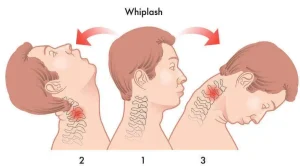Overview
Diagnosis
To diagnose whiplash, your healthcare professional will begin by discussing your symptoms and how the injury occurred. A physical examination is then performed to evaluate the range of motion in your neck and shoulders, check for tenderness, and assess any neurological symptoms such as numbness or weakness.
Additional tests may be used to rule out other injuries or complications:
-
X-rays: These images can help detect bone fractures, dislocations, or degenerative changes in the spine.
-
CT scan: If the X-rays are inconclusive, a CT scan may be ordered to provide detailed images of the bones and soft tissues in your neck.
-
MRI scan: This imaging test can detect injuries to soft tissues such as muscles, ligaments, intervertebral discs, or the spinal cord that may not be visible on X-rays.
In most cases, whiplash is diagnosed based on symptoms and a physical exam, but imaging is used when a more serious injury is suspected.
Treatment
The goal of whiplash treatment is to manage pain, restore normal movement, and help you return to your regular activities as soon as possible. Most people recover within a few weeks, although some may experience chronic pain that requires longer treatment.
Common treatment options include:
-
Pain management:
-
Over-the-counter pain relievers such as ibuprofen or acetaminophen can help reduce pain and inflammation.
-
In more severe cases, your healthcare professional may prescribe stronger pain medications or muscle relaxants.
-
-
Physical therapy: Gentle exercises and stretches guided by a physical therapist can help restore movement, improve flexibility, and strengthen neck and shoulder muscles. Early movement is often encouraged to promote healing and prevent stiffness.
-
Heat or cold therapy: Applying ice packs during the first few days can help reduce swelling and pain. After a few days, switching to heat therapy may help relax tight muscles.
-
Neck brace or collar: Short-term use of a soft cervical collar may provide support and limit movement while your neck heals. However, prolonged use is discouraged because it can weaken neck muscles.
-
Injections: In some cases, numbing medications or corticosteroid injections are used to manage persistent pain.
-
Alternative therapies: Some people find relief with chiropractic adjustments, acupuncture, or massage therapy, though these should only be done by qualified professionals.
Outlook
Most cases of whiplash improve within a few weeks with proper care. However, some individuals may develop long-term symptoms such as neck stiffness, headaches, or dizziness. Consistent rehabilitation and following your healthcare provider’s guidance can significantly improve recovery and reduce the risk of chronic pain.
Advertisement

